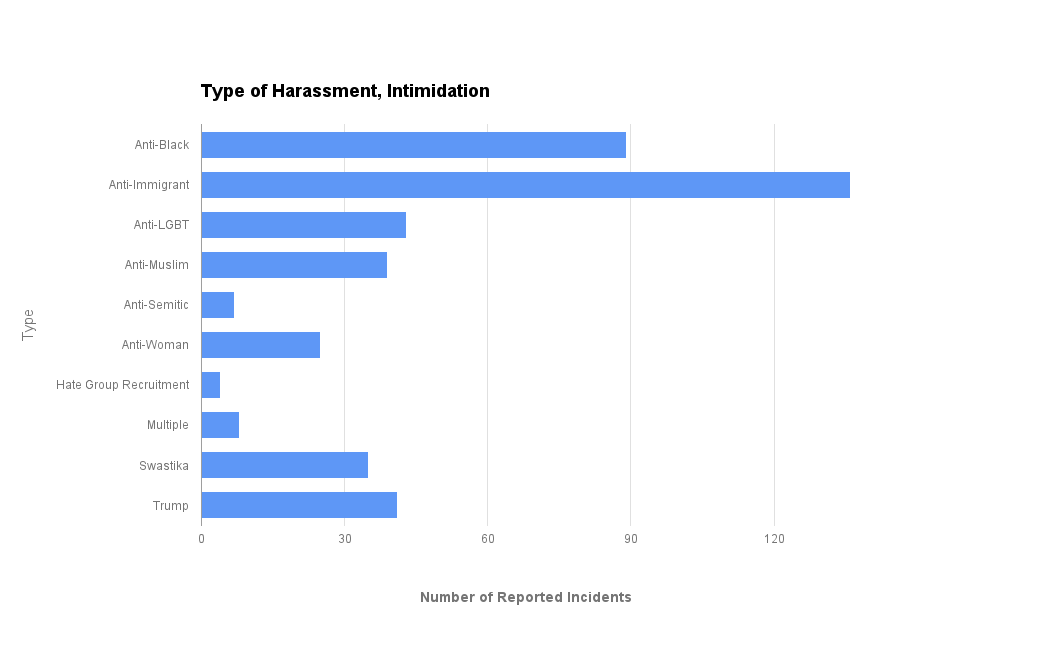an email exchange
Hi Andy:
Hi Andy:
I talked to Ken Christmon about the Hitler quote on the Diversity Wall, and he agreed that, as offensive as it is, it is not a threat, and doesn't promote violence. We would have a completely different reaction to a swastika or other threatening symbol.
Because my conversation with you got me thinking, we've scheduled a "Let's Talk About the Election" forum for noon to 1:15 p.m. on Thursday, Dec. 1. Ken is going to moderate the discussion, and I'm hoping you'll be able to be there, and will feel comfortable bringing up the Hitler quote as an example of a hostile environment.
Anyway, thank you so much for talking with me, and educating me. And I meant it when I invited you to stop by anytime to talk!
Best,
Julie
Good morning Julie and Ken,
Every day, students are seeing these things on the news, in our social media, and shared directly between us in our daily concerned conversations:

I can give so many more photos of people celebrating the election results, be it on a ballfield or on a church, it doesn't matter, this is not a series of isolated incidents. This is the very real national climate of hate we live within. The student body carries the full emotional weight of this with us as we move about our daily lives.
The Southern Poverty Law Center is tracking these post-election hate crimes, and a large proportion are taking place on universities (bar at bottom of chart):

And it's not just "those universities over there". This is our university. This is us.
This is happening here. This has cost me considerable energy spent away from focusing on my studies. My friend who also saw it reported that she couldn't even pay attention during her next class because this was on her mind, and missed out on learning a good deal of the material that day. IN this way, holding space for hate directly interferes with the educational mission of IPFW.
I am baffled how the leader of the entire movement which the swastika has come to represent is not a symbol of hate. What does it take for people to recognize the name of Hitler as an active and relevent hate symbol? Does it need to have a "heil" before it? Does it need to be abbreviated as "HH" or "88", to emulate visual qualities we often associate with iconography, before we take the need to protect our student body seriously?
You would have me appear before an open forum of students, 2 weeks from now, and explain to them in great detail how you have already failed them. In your own words you admit this situation is creating a hostile environment; that would be the entire reason for me to raise this issue in the proposed discussion. In fact, I would be causing active harm to the student body by reassuring white supremacists on campus that their hate already has been given a place here without repercussions.
It is not timely to wait for even more explicit (how much more explicit do we need?!) examples of hate before taking a decisive and proactive stance against it. We already know there are people on campus willing and able to harass students, targeting their gender, and it is no stretch to say this complete disregard for the well-being of others couldn't easily find more diverse targets. Waiting for more hate, just to be sure it's really happening to us, is not good enough.
We need a decisive and actively enforced policy that we don't hold space for hate, or else we need to preemptively remove the opportunities for people to voice their hate in the first place.
Toward the end of our friendly conversation yesterday, Julie stated that you wanted to make a point of remembering to wear you safety pin every day now. The reasons given behind the movement of wearing the safety pin symbol include: "I will protect whoever I can. I will speak up when I see injustice done." I am pleading with you not to render hollow this symbol of hope. Now is exactly the moment when you need to protect those you have the power to protect when you see injustice being done.
Now is the moment for action.
Andy Semler

